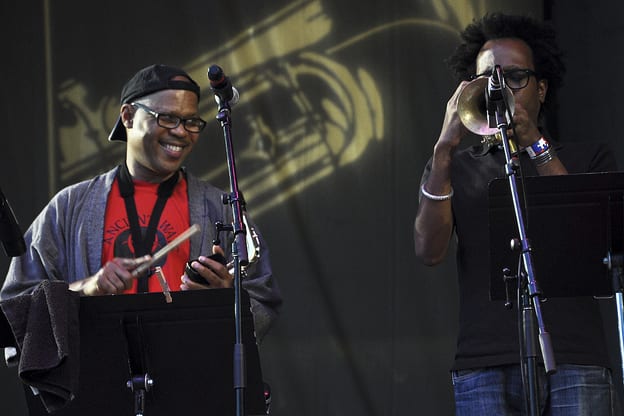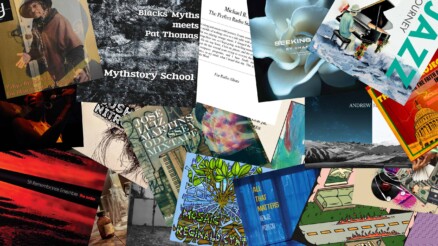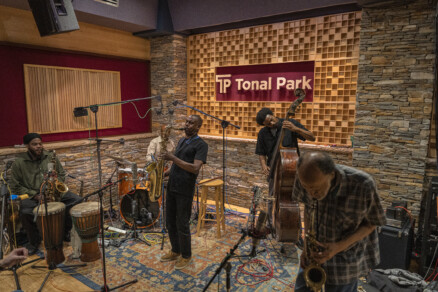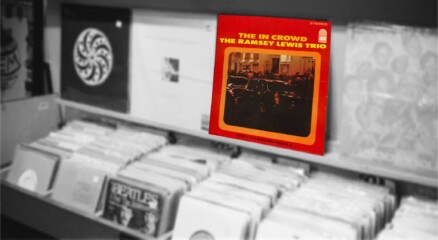Interview | Steve Coleman, an innovator for the ages, will kick off Atlas’s bold new jazz season


by Luke Stewart
Editorial board
The Atlas Performing Arts Center on Wednesday kicks off its third jazz season, featuring its most adventurous lineup of nationally renowned artists to date. Typically, you’d have little hope of hearing many of these musicians in a sumptuous theater setting like the Atlas, if they made it to D.C. at all. But thanks to some bold and savvy work from the team at the Atlas (spearheaded by their jazz curator, the local saxophonist Brad Linde) you’ll be able to catch the likes of guitarist and sound effects explorer Mary Halvorson, big band fusioneer Darcy James Argue, and drummer/composer John Hollenbeck. Tickets to all shows are $25, as long as you buy in advance. It’s a lot to look forward to.
Tomorrow’s season-inaugurating performer is the saxophonist Steve Coleman, one of the music world’s most catalytic agents of innovation over the past 25 years. For anyone looking for proof that the music called “jazz” is alive and well, one need look no further than Coleman. (Let’s just not bother calling it jazz around him; he’ll explain why below.) His influence spans across decades of musicians in improvised music, as well as hip-hop and electronic music. He has continuously stretched the boundaries, while learning from the masters of his day.
The Chicago native purposely placed himself among innovative legends in jazz music, from Von Freeman to Cecil Taylor, soaking up knowledge from those who had helped to build and define it. The emergence in the 1980s of M-Base, a strain of thought and associated community that he helped to pioneer, garnered him widespread acclaim and interest. Yet he has continued to develop his music through many facets of musical expression. With his group the Five Elements, Coleman has helped to propel the careers of some of the most well-known contemporary jazz musicians while also providing immense insight, as he travels the world performing and researching many approaches to music-making. In his stop at the Atlas tomorrow, the prolific composer and innovator will perform new music with his quartet. He spoke to CapitalBop this week, and offered some insight into the development of M-Base, his anti-genre approach, and his work in the 1990s with Opus Akoben, a group of D.C.-based MCs.
CapitalBop: What does M-Base stand for?
Steve Coleman: Macro-Basic Array of Systematic Extemporizations, but my take on names is that they really don’t mean much. What’s more important is the idea and the concept that is actually produced. The only thing the press got different from where I’m coming from is that, for me, the idea of M-Base is that it was never the name of a music. It wasn’t a musical style, and that’s what it seems like the press has chosen to concentrate on.
M-Base started off as an internal name. It was just a phrase that we created so that we would know what we were talking about among each other. And somebody heard me and Greg Osby use the phrase in the back of the Village Vanguard one night. He was a journalist. He was like, “What was that word you just used?” And we tried to just avoid it, but he kept pushing. And we told him it was just M-Base, a term we use among ourselves. Then he wanted to do an interview about it and this and that, and that’s how the whole thing got started. It just came about because somebody overheard something.
CB: Would you consider your music to be continually M-Base?
SC: Yeah, because if it was me alone, I wouldn’t call it anything. I wouldn’t need to call it anything, you just do what you do. People have a lot of names for things: jazz, bebop, hard-bop. I don’t look at the music like that in general – my music or even the music of those guys in the past. I just look at it in terms of personality. So I might say the music of Thelonious Monk, or Prince, or whoever it is. For me it’s just their personality that expresses music. I don’t really look at it from the commercial standpoint of what style it is. Certainly, when I’m creating music with people, we don’t get together and say, “Let’s play some jazz” or “Let’s play some this or that.” I’ve never been a part of a situation like that where we talk about it amongst ourselves.
“Names … really don’t mean much. What’s more important is the idea and the concept that is actually produced…. For me, the idea of M-Base is that it was never the name of a music.”
CB: Some of our readers might recall a D.C. group called Opus Akoben, with whom you have collaborated in the past. How did that experience come to fruition, and how was the collaboration from your perspective?
SC: I knew those cats long before they had anything called Opus Akoben. It came about because of Greg Tate. I told Greg that I was looking for a certain kind of musician. Someone who mainly learned their thing on the street. He said, “Are you looking for some spoken word cats?” I said, “It could be that, or whatever.” I was not looking for a commercial thing. I’m not interested in cats who just want to make a hit record. I’m interested in people who want to stretch, but who have that kind of sensibility. So that meant somebody who wasn’t like me, like, playing a saxophone, playing notes all over the place. I wanted people who bring the perspective of the streets, more grassroots-oriented. So he interpreted that as MCs, so that’s what happened at that time in the early ’90s.
He had a partner named Ezra Grier, who was a bass player in the D.C. area, who worked with a lot of young cats, so he would know some people. So he put me in contact with Ezra, and it was through Ezra that I met those guys. They didn’t know about anything I was doing up until that point. At the same time, I was doing the same thing in other cities, in Philadelphia and in New York. In Philadelphia, I ran into the cats who eventually became the Roots. In New York, I ran into some cats from Long Island who have since disappeared. I brought all three of these groups of cats together, and none of them knew each other. They were all in what some people would call hip-hop, but it wasn’t commercial. It was just stuff that cats were doing on the streets. What I wanted to do was mix their talent with that my group was doing. I tried to do this many times with many different people; most of the time it failed. This group of cats said they wanted to try it.
The most success I had was with the cats in Philly, particularly this cat named Tariq who’s still the main guy in the Roots.
CB: Also known as Black Thought.
SC: Right, Black Thought. So I took him on tour with me in Europe and so forth, and then the cats from D.C. They went on tour with me before they were Opus Akoben. So basically, in a way, they were mentored under me, because they didn’t know what touring was. They would go back to D.C. and their partners would be like, “What?” They got to see what we did in my group, and we got to see what they did. So I got to work with [Opus Akoben] a lot because Tariq and them got a deal pretty early. They signed with one of Madonna’s label and it went on from there. Kokayi and Sub Z and those guys worked with me for a while. Eventually I was like, “Well, you all need to start your own thing and do what you want to do.” But by that point, they had changed because they had this other experience, so they brought this other thing with what they’re doing.
“The music that I’m doing is hard to describe. It’s based on this biological stuff.”
CB: What music will you be bringing to the Atlas?
SC: Its a quartet: alto sax, trumpet, bass and drums. It’s all people I’ve worked with for a long time, although we’re doing new music. I’ve known the drummer, who is from the D.C. area, Sean Rickman. I’ve known him since the mid ’90s. The bass player, Anthony Tidd, same thing. The trumpet player has been in my band for the past 10 years, Jonathan Finlayson. We’re in the midst of doing a recording. We did part of it already and we’re doing another part of it soon. The music that I’m doing is hard to describe. It’s based on this biological stuff.
CB: The Five Elements?
SC: Yeah, but this is a little more literal than it has been in the past. A lot of it is coming off of some of the people I’ve been meeting and talks I’ve been having with guys who are into a very shamanistic kind of thing, how sound relates to the body. I’ve been interested in those ideas for a long time, and the musical structures are now being influenced by that. We’ve been calling it “Heartbeat” among ourselves.
—
Steve Coleman performs at 8 p.m. on Wednesday at the Atlas Performing Arts Center. You can find more information on that show here, and you can buy tickets in advance for $25 here.
Anthony Tidd, Atlas District, Atlas Performing Arts Center, DC, DC jazz, jazz, Jonathan Finlayson, M-BASE, Sean Rickman, Steve Coleman, Washington




